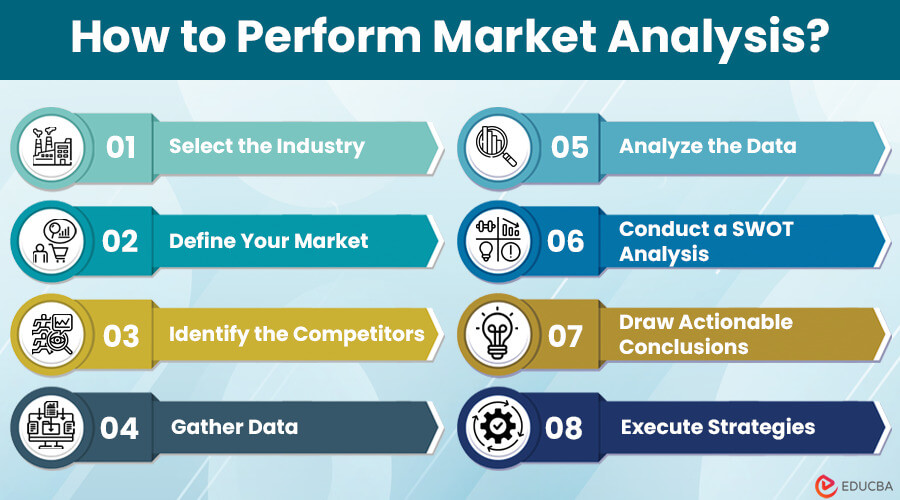What is Market Analysis?
In market analysis, companies try to understand a specific market from a particular industry in detail. They analyze economic factors (demand/supply), consumer behavior (purchase patterns), global trends (inflation), etc. It assists them in making important decisions regarding product development, pricing, marketing efforts, etc.
Market analysis is the process of examining various factors that impact a particular market to understand its current state and potential future developments. This analysis is essential for companies to make informed decisions regarding their business. Whether starting a new business or launching a new product, a thorough market analysis is important to achieving your business goals.
Table of Contents
How to Perform Market Analysis?
Let us understand the market analysis process with the help of the example of the Electric Vehicle Industry. The process involves the following steps:
1. Select the Industry
You can start your market analysis by choosing an industry you want to study. To select an industry, you must look at market size, growth potential, and how it aligns with your business objectives.
2. Define Your Market
Clearly define the market segment within the chosen industry you want to analyze. You can divide the market depending on demographics, psychographics, geographic location, or buying behavior.
3. Identify Your Competitors
Find all companies offering similar products/services in the selected market. You must also consider indirect competitors that don’t sell the same products/services but provide alternative solutions to the same consumer needs.
4. Gather Data
Collect relevant data about the market, including market size, growth trends, demographics, customer preferences, purchasing behavior, pricing strategies, distribution channels, and regulatory factors. You can gather data from various sources, such as industry reports, market research firms, government publications, trade associations, and online databases.
5. Analyze the Data
Analyze and identify patterns and trends after collecting the data. Based on your analysis, predict future market trends, opportunities, and challenges. It will help you plan how to maximize opportunities and reduce problems.
6. Conduct a SWOT Analysis
Use SWOT analysis to find your company’s market strengths, weaknesses, opportunities, and threats.
Example: Performing a SWOT analysis for your company entering the electric vehicle market might reveal the following:
- Strengths like innovative technology,
- Weaknesses such as limited brand recognition compared to established automakers,
- Opportunities such as government subsidies for electric vehicle purchases,
- Threats such as competition from traditional automakers entering the electric vehicle market.
7. Draw Actionable Conclusions
Summarize your findings and conclusions about the market’s overall state and suggest strategic actions for your company to succeed in the market.
8. Execute Strategies
Take the conclusions into consideration and implement recommended strategies. These strategies may include marketing campaigns or pricing adjustments.
Benefits
Here are the benefits of conducting market analysis:
1. Identifying Opportunities
Market analysis helps businesses identify market areas that aren’t getting enough attention. Moreover, by understanding market dynamics, businesses can discover the latest trends and opportunities for growth.
2. Understanding Customer Needs
Businesses can understand their customer’s requirements in a better way using market analysis. It helps them make their products, services, and marketing better suited to their customers.
3. Assessing Competitors
It allows businesses to evaluate their competitors’ strengths, weaknesses, strategies, and market positioning. By understanding your competition, you can identify how to make your business unique and gain a competitive advantage.
4. Reducing Risks
It lets businesses plan ahead to reduce the effects of threats or challenges in the market. Whether it’s changes in consumer preferences, regulatory developments, or competitive threats, market analysis helps businesses predict and respond effectively to potential risks.
5. Informing Strategic Decision-Making
It provides valuable data and insights for strategic decision-making across all business areas. Businesses can allocate resources more effectively by making data-driven decisions and increasing their chances of success.
6. Improving Performance
It also helps firms improve their business performance and market competitiveness. By staying informed about market dynamics, businesses can adapt quickly to changing conditions, capitalize on opportunities, and achieve sustainable growth.
Market Analysis Vs. Market Research – Comparison Table
| Aspect | Market Analysis | Market Research |
| Definition | It examines market conditions, trends, and forecasts to make strategic business decisions. | It gathers and analyzes data about customers, competitors, and market trends to understand market dynamics. |
| Scope | It has a broad and strategic scope. | It is focused and tactical. |
| Purpose | To assess market opportunities, identify potential risks, and inform strategic planning. | To gather insights for product development, marketing strategies, and identifying consumer needs. |
| Methods | Utilizes existing data, statistical analysis, trend analysis, and forecasting techniques. | Involves primary (surveys, interviews, focus groups) and secondary research (data analysis, literature review). |
| Decision-making | Influences high-level strategic decisions. | Supports operational and tactical decision-making. |
| Examples | Analyze market trends to enter new markets or launch new products. | Conduct customer surveys to gather feedback on a product. |
| Dependency on Data | Relies heavily on historical and current data. | Depends on both quantitative and qualitative data. |
| Cost | May require substantial investment in data collection and analysis tools. | Costs vary depending on research methods and sample size. |
| Risk Assessment | Helps in assessing potential risks and uncertainties in the market. | Assists in identifying risks related to product launches, marketing campaigns, etc. |
| Competitive Advantage | Provides insights for gaining a competitive edge. | Helps in understanding competitors’ strategies and market positioning. |
Final Thoughts
Market analysis is like a roadmap for businesses. It helps you understand what’s happening in the market, whether you are starting a new business, checking out your current market, or considering expanding. By studying the market, you can determine the good opportunities and the risks. Additionally, it gives you ideas for marketing your products or services and making your business idea work.
Frequently Asked Questions (FAQs)
Q1. What is a comparative market analysis?
Answer: A comparative market analysis (CMA) evaluates similar properties in a specific area to determine their market value. Real estate agents use CMAs to help sellers pick the right price for their property. They compare things like size, location, condition, and recent sales of similar properties to guess how much the seller’s property is worth. CMAs provide valuable insights for sellers and buyers in the real estate market.
Q2. What are the important elements of market analysis?
Answer: The key elements of market analysis include:
- Industry analysis: An evaluation of the industry and market trends.
- Target market: A description of the target customers and their needs.
- Competition: An analysis of the competitive landscape and the strengths and weaknesses of competitors.
- Marketing and sales strategies: An evaluation of the marketing and sales plans and their potential effectiveness.
Q3. What is market analysis for a business plan?
Answer: Market analysis for a business plan involves researching and evaluating market conditions, trends, and dynamics. It includes understanding your target market, customer preferences, competitors, and potential risks. Its purpose is to inform strategic decisions for product development, marketing, pricing, and distribution, ensuring the success of your business venture.
Recommended Articles
If you found this article on market analysis informative, check out the following recommendations.


